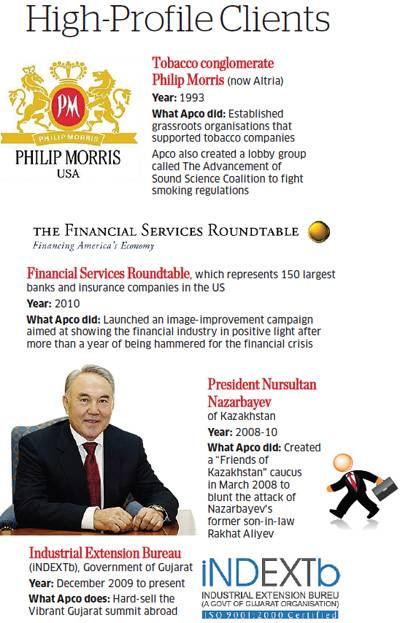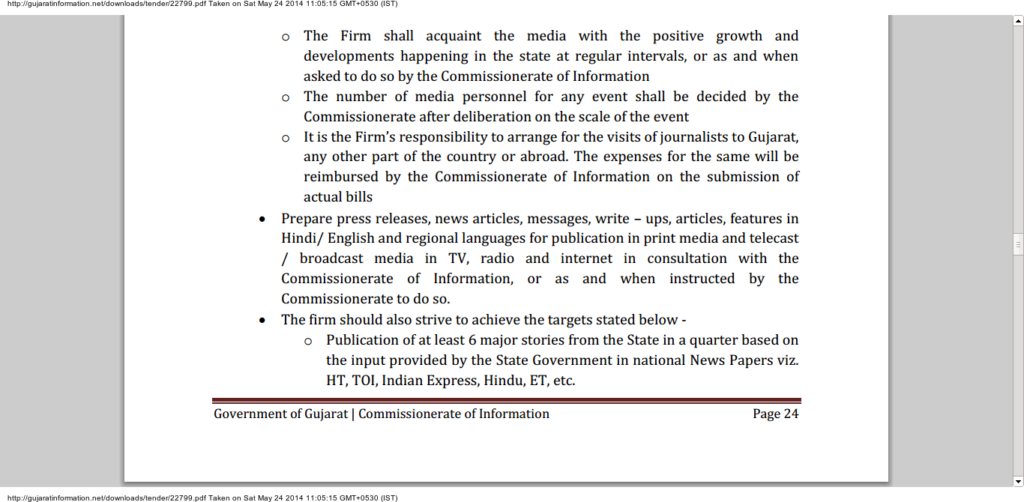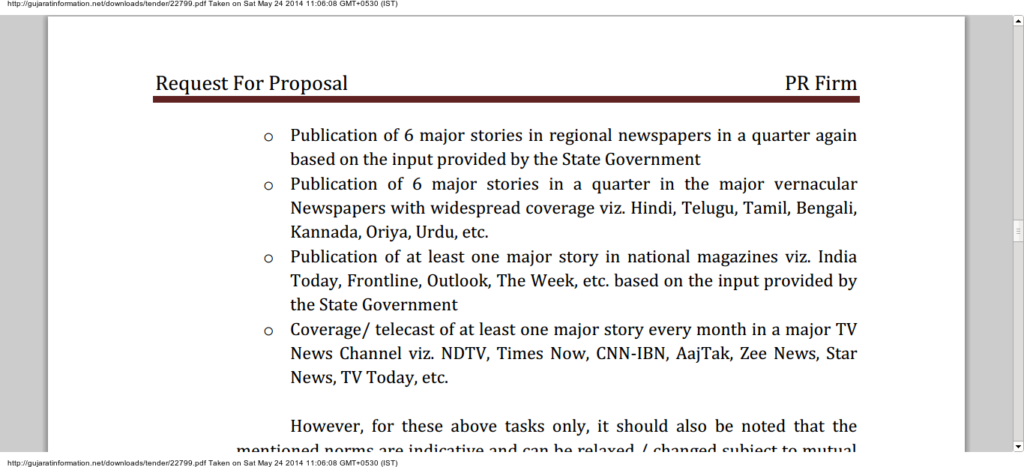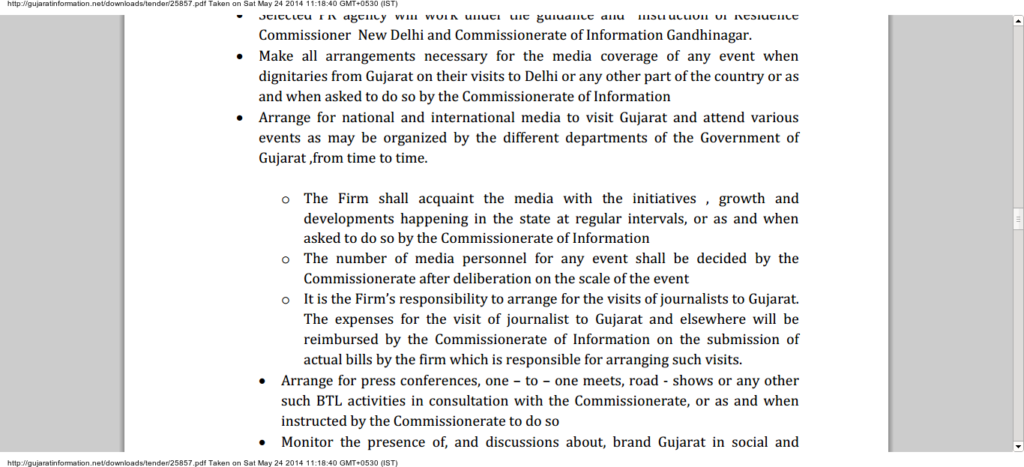Modi came to power unelected. Soon after his becoming Chief Minister of Gujarat, the Gujarat Riots happened. Shamelessly defending the massacres as a righteous “reaction” Modi successfully polarized the majority against the minority to win in 2002.
For the younger readers, who don’t remember the Vinash Purush speeches that preceeded the Vikas Purush speeches, here are some excerpts (Apologies for poorly edited video. Will try to replace with better version when I figure out the video editor):
While these speeches can get him elected by a majority just recovering from unrest and not wanting threats, this is not possible to recreate for every election.
Enter APCO – in 2006 – supposedly to promote a vibrant Gujarat (remember India shining in 2004?) but very conveniently in time for the 2007 elections.
APCO has a rich history of making ugly people better (Read: Mechanics of Narendra Modi’s PR agency : APCO Worldwide – Orchestrating our Future). Considering the ruling party’s penchant for snowing people under avalanche of FIRs, I thought it prudent to use infographics reported by media. Here are some of APCO’s clients.

The task was to show that Gujarat under Modi had become an ideal state that people worldwide would want to invest in and visit. APCO’s advisory council is illustrious.

Of course, this was happening on the state budget. Or as elite economists like to call it, on the Gujarati tax payer’s money.
We saw the “Vibrant Gujarat” campaign emerge even more strongly in 2010 and 2011 in time for Gujarat Assembly Elections 2012. Also an election Modi won.
And now here is the strange part. Gujarat Government spent massive amounts of money in 2013 to polish up Gujarat image. Incidentally, the Gujarat image was a key part of Modi’s election campaign for the Lok Sabha Elections. Additionally, moving from APCO to Indian PR firms probably allowed money to deliver more as well, now that the formula was established.
One wonders why the Gujarat Government needs PR firms based in Delhi in the run up to the Lok Sabha Elections. Also, the PR firms were not just expected to promote Gujarat, but to ensure positive coverage in News media – and this is in official government documents requesting tenders.
For example, Request for proposal for Selection of Public Relations Firm from June 2013 is interesting in “Scope of work” – Page 23 onwards. It desires the following from the providers.


Put together, this is a request for tenders for paid news Nationwide – not even in Gujarat. Now why in the world would Gujarat government want to acquaint people Nationwide of what is happening in Gujarat in the year before National Elections? Particularly when the Chief Minister was to use Gujarat as an advertisement of himself in his National Campaign more than BJP achievements? All pretending to be on some other budget of course – sometimes Gujarat Government, sometimes hiding behind the party being allowed unlimited expenses. Narendra Modi’s speeches have constantly referred to the information spread about Gujarat by these paid campaigns as resounding praise for Gujarat (in other words, his leadership) and built his campaign around it. So not only is it use of government funds to undermine the media and fool people into thinking Gujarat gets spoken well more than other states, but also to aid personal and party campaign in National elections.
But this is hardly the only such request for tenders. Here is another similar one from November 2013 asking for arrangements for Indian and foreign media visits including number of media personnel with expenses paid. It doesn’t get more paid news than this, does it?

But wait. It gets better. Here’s one from 2012 asking for Facebook 3,00,000 Facebook likes (from 8,000) for the IEC page (which sings virtues of Gujarat under Modi). Remember Modi’s popularity boom on the internet? And yes, it wants likes in very specific ways – from Gujarat, target cities of India, target countries worldwide, etc. Page 20 onwards. You’re welcome.
Then you have Request for proposal from Total Solution Provider of Multi Media work including short video, documentaries, social media communications along with web portal design and mobile application development and maintenance work for I.E.C. Activities from June 2013.
These requests for proposals are just a few from the first page of search results.
Quite clearly, there is a boom in advertisement of Gujarat in the build up to National Elections, ON GUJARAT GOVERNMENT FUNDS. The promotion is well beyond the state of Gujarat and the purpose it serves is unclear.
Of course the Gujarat Government has a right to market itself as an investment destination, but the use of this material in Modi’s campaigns needs to be reviewed as well, considering the timing and the abundant use of exactly these kinds of services in his campaign.
There are other examples of paid news including the excellent reporting in Caravan Magazine about the right wing influence in Network 18 and a brazen instance of paid news – which ought to be verified by the Election Commission. Surely an individual’s budget cannot afford Prime Time TV and still be within limits?
Last year, Vivian Fernandes, who co-wrote Bahl’s book, was dispatched to Gujarat to interview the chief minister, Narendra Modi. A person involved with the production of the interview recalled that Fernandes asked Modi a difficult question about water conservation in Gujarat. Modi’s organisers had asked to see the questions before the interview, and demanded the water conservation question’s removal. When Fernandes sprung it on him anyway, Modi broke away from the camera and glared at a public relations executive in the room. “Why is he talking like this?” the person recalled Modi saying. “Are we not paying for this interview?” The production crew realised that the interview was part of a promotion for Modi. When Bahl heard about the curtailed interview, he reportedly told Fernandes, “We should have a clear line between marketing and editorial.” – See more at: http://www.caravanmagazine.in/reportage/network-effect?page=0,1
It should not be so difficult to verify whether any such interview marked as marketing appeared on TV. And, if the ones that did appear on TV after Modi filed his nomination appear in Modi’s accounts. Surely one on one interviews of Prime Ministerial candidate cannot be put on a BJP budget?
CMS Media Labs analysis also shows that Modi got 33.21% of Prime Time coverage on five channels (Aaj Tak, ABP News, Zee News, NDTV 24×7 and CNN IBN) monitored (not including India TV or Times Now – where Modi interviews appeared). Modi received nearly 7.5 times more coverage than Congress vice-president Rahul Gandhi during prime time. Kejriwal got about 10.31% of total coverage (much of it criticism), Gandhi got only about 4.33%. In party-wise coverage, BJP had nearly 38% or about 1,507 minutes, while about 1,101 minutes or 27.75% of television news coverage went to Congress.
Additionally, several exposes that showed BJP in bad light – putting up false candidates, seats, votes and more got silenced by media.
Paid news nailed Ashok Chavan. Should Modi be an exception? Election Commission should examine details of the work furnished through hires of such PR firms on Gujarat Government funds and verify that they have not been used for National campaigning by official party and leaders accounts and that Narendra Modi’s campaigns do indeed fit the 70 lakh he is legally allowed after all the loopholes or expenses have run out. Manufactured popularity must not subvert the principles of free and fair elections.

The whistle Blowers Protection Act (2011, of India) has not come into
force as on date…
http://tinyurl.com/nf4oxof
Bloody good snoopin’, Vidyut!
It is not surprising that in the middle of all this, the Delhi High court finds both the Congress and BJP guilty of receiving foreign funding…
The news barely got any attention.
http://timesofindia.indiatimes.com/home/lok-sabha-elections-2014/news/Delhi-HC-finds-BJP-Congress-guilty-of-receiving-foreign-funding/articleshow/32880140.cms